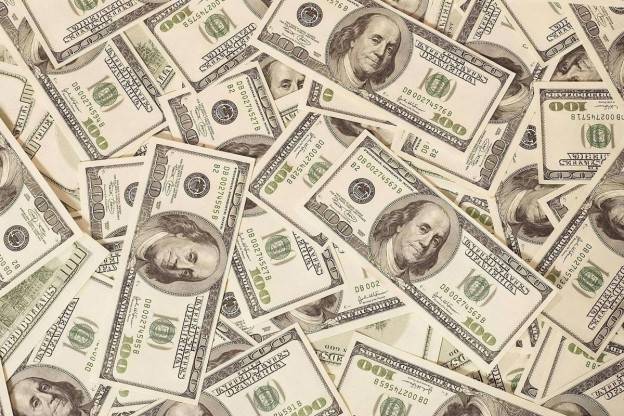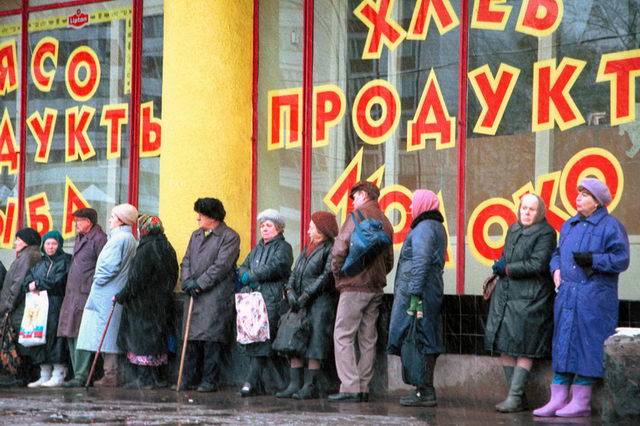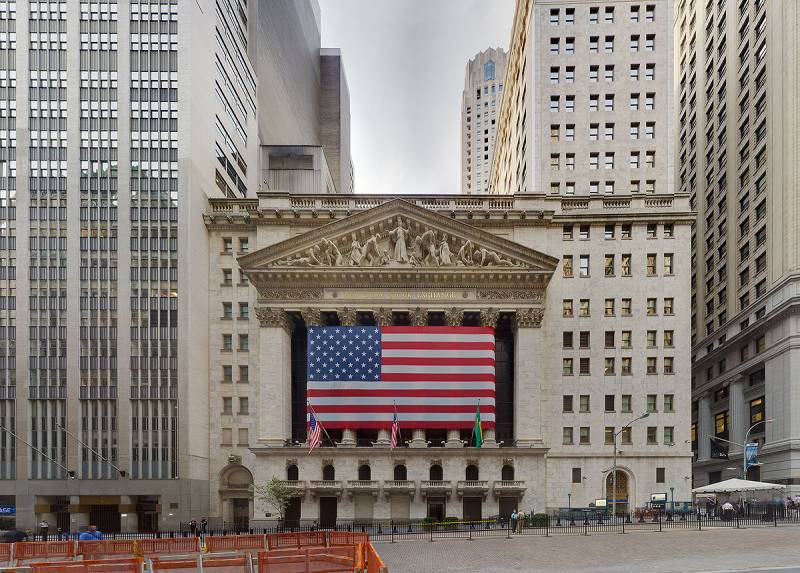A crisis is coming. What to do?
If we apply this model to the analysis of the development of the Russian economy in recent years, we see that Russia is now going through a phase of recovery. The pace of production is gradually increasing, the quality of products is growing. The revival could well have developed into a boom in the national economy, but there is one very significant problem - modern Russia is too tightly integrated into the world economy and too dependent on the economic situation and events in other states, including the United States.
In 2009, the US economy emerged from the 2007-2009 crisis, after which the gross domestic product of the United States grew steadily. At the end of 2010, the United States managed to exceed its pre-crisis GDP figures. So began the phase of recovery of the American economy, which has been going on for almost 7 years. Experts say that such a long period of continuous GDP growth indicates the inevitable approach of a new crisis. If we turn to an analysis of the previous features of the development of the American economy, then it is clear that all the stages of recovery also lasted on average about seven to nine years. Then crisis and depression inevitably followed.
Candidate of Economic Sciences and Banker Vladimir Gromkovsky highlights the following criteria for the coming economic crisis.
1. Capacity Utilization Indicators
Before the onset of the crisis, capacity utilization begins to gradually decline. This is due to the fact that, despite the beginning of a decline in demand for products, all new and new production capacities continue to run due to inertia. As a result, we see how new shops are being built, new equipment is being commissioned, but it is no longer possible to load it with the proper amount of products. Production capacity starts to load less than they should. Currently, the level of utilization of US manufacturing capacity began to decline.
2. The state of the stock market
As a second important indicator of the coming crisis, V. Gromkovsky highlights the state of the stock market. If the crisis is nearing, the stock market overheats, which is associated with an increase in stock purchases and an increase in their prices. Numerous speculators, non-professional players appear on the market. More money is invested in the securities market, while investments in the development of industry and trade are gradually decreasing.
3. Number of building permits
Immediately before the crisis, the number of permits issued for the construction of residential buildings begins to decrease. The issuing bodies understand perfectly well - if there is a crisis, the majority of citizens or legal entities will not be able to bring the construction of buildings to commissioning. Actually, this is what happened in Russia in 2014-2015, when the real estate market crisis followed currency inflation and sanctions. Sales of residential and commercial real estate have drastically reduced, many facilities under construction have “risen”, which again actualized the problem of “defrauded real estate investors”. Meanwhile, construction companies do not hand over objects not because of their “maliciousness” or the desire to steal other people's money, but for the reason that they simply do not have the means to complete construction.
Gromkovsky highlights another very important point - the growth of public interest in “virtual” finances and “virtual” financial speculations. Back in the already distant 2009, someone Satoshi Nakamoto presented the first Bitcoin to the world. A bit later, two pizzas were bought for 10 of thousands of bitcoins. In February, 2011, the cost of one bitcoin rose to one dollar, but most experts were sure that cryptocurrency is unlikely to significantly increase its price. But after a few months, the world was shocked - Bitcoin rose in price right 28 once! Years have passed - and now Bitcoin costs $ 8700 (a mark of the Coindesk exchange on Saturday 2 December 2017 of the year). The capitalization of the cryptocurrency market increased to 255 billion dollars - ten times compared with the figures for April 2017 of the year (25 billion dollars).
Meanwhile, a number of experts are convinced that the boom in the cryptocurrency market foreshadows a global financial catastrophe. For example, the German economist and banker Jens Weidmann draws attention to the instability of digital currencies, but believes that banks should be bothered to strengthen control over cryptocurrency. If banks switch to the use of digital currency, they will be able to significantly secure their positions during economic crises. Indeed, in crisis situations, people first of all “run” to the bank in order to withdraw all the available cash. In turn, banks are puzzled by the protection of their funds from such withdrawals.
It is clear that cryptocurrency currently violates the monopoly of banks on financial transactions and the storage of money, as well as prevent the establishment of full state control over foreign exchange transactions. Thus, since in the modern world the process of cryptocurrency exit from the shadow sphere gradually begins, the state is moving to a more loyal policy regarding the cryptocurrency market. The rising cost of cryptocurrency has objective reasons. First, a number of states are interested in attracting investment through the legalization of cryptocurrency transactions. Secondly, blockchain technology is becoming more and more active - not only in the financial sphere, but also in the sphere of public administration (the same Dubai, where they are going to transfer the entire system of power in the emirate to blockchain technology).
At the same time, the features of the development of the modern economy are such that there is hope for the emergence of some “counter-cyclical” mechanisms that can significantly delay the onset of the global financial and economic crisis. Of great importance for world markets, in particular, was the election for the post of US President Donald Trump. As you know, Trump has his own program for the development of the American economy. President Trump sees the need to revive production, return to the extraction of raw materials on American territory and reduce US dependence on other states and markets. If Trump succeeds in creating such conditions that the creditworthiness of the American manufacturer rises, then it will be possible to really talk about the postponement (in the long run) of the economic crisis. However, so far Trump speaks only about changes in the tax system in the USA, which are important, but not so significant in the scale of the problem we are considering.

However, the American economy is American, and we are concerned about how the processes occurring in the American and world markets can affect the Russian economy and what to expect in our country. As we know, in recent years, the policy of the Russian leadership is aimed at improving the economic security and self-sufficiency of the country. The introduction of sanctions against Russia, oddly enough, led to our economy and to positive consequences, primarily in the direction of the development of domestic production. Nevertheless, it is impossible to achieve complete autarky in modern conditions; moreover, this is detrimental to the economic development of the country. Therefore, Russia will still react to the world crisis, even being in the stage of reviving the national economy.
Any disturbing changes in the global financial market have always entailed the desire of investors to reduce the risks of their investment portfolios. In other words, as soon as there is a threat of an economic crisis, investors tend to transfer their funds to such funds, which are least subject to risks and are guaranteed to save investments. Naturally, in the event of the unreliability of the currency of any state, investors will immediately seek to get rid of such currency in favor of more reliable currencies. In the modern world, the strongest positions still retain the dollar, although there is every reason to believe that its domination may falter in the future. It is the dollars that Russians are starting to buy in a crisis situation, and the value of the dollar immediately increases. So it was all over the modern, post-Soviet Russian stories.
It should be remembered that the Russian ruble is the currency of the country exporting raw materials. Such currencies are regarded as unreliable and, when the economic crisis approaches, they prefer to quickly sell them and exchange them for more reliable currencies or investments. The fact is that the currencies of countries - exporters of raw materials, and Russia are no exception, are dependent on oil prices. It has long been known that a cyclical economic crisis entails a reduction in the demand for oil and oil products, which inevitably "collapses" the currencies of countries - exporters of oil. Fall oil production contributes to a very impressive change in the price of a barrel.
Since the bulk of Russia's income comes from the sale of raw materials, primarily hydrocarbons, the Russian economy is directly dependent on the economic situation of the United States. A crisis begins in the United States — and inevitably follows, firstly, a fall in oil prices and a decline in revenues from its sales, and secondly, an exit of investors from ruble investments. The ruble falls dramatically in price, aided by the desire of people to transfer their savings into the dollar equivalent.

How does the decline in oil prices in the Russian market? First of all, the consequences of the economic crisis are well seen on the example of the real estate market. For a long time, real estate prices in Russia grew and reached a very high level by the 2010 years. Then, when in 2014-2015. there was currency inflation, real estate prices in dollar terms fell very much. For example, if before the crisis, an apartment cost 2 million rubles, which was approximately 57 thousand dollars, now the cost of the same apartment (at best) is also 2 million rubles, only now it is 34 thousand dollars. Accordingly, those people who had savings in dollars (and euros), as a result of the crisis, significantly increased their purchasing opportunities. Suffice it to recall, as in 1990-ies, real estate prices, as well as many other goods, were indicated in "conventional units" - cu, at a cost equivalent to a dollar.
What investments in modern conditions remain the most reliable? First, you should transfer your savings into "hard" currencies. These include, of course, the dollar. Those who translate at least part of their savings into dollars, as a rule, always win in case of large-scale crises (we are talking about ordinary citizens). If we talk about the long term, then you can keep some of the funds in currencies, which in this cycle should demonstrate sustainability. Do not be afraid of losing bank interest - in any case, it will be a less tangible blow than the losses that will be incurred if the exchange does not take place.
Secondly, we must be very careful about real estate investments. Property prices will fall, and if the downward trend in oil prices persists, then ultimately prices for Russian real estate may fall several times. If an investor wants to save and increase his money, then investing in real estate during the crisis period is a rash step. And this applies to residential and commercial real estate.
However, on the other hand, the decline in real estate prices has its advantages. If a citizen has sufficient savings, then with a maximum reduction in real estate prices, he can at low prices provide housing “for the future” of his children and grandchildren, as well as create a portfolio for passive income, which he will be provided with renting of cheaply purchased real estate for rent. Rent apartments and rooms in large cities where there is work and educational institutions will always be. As we know, housing surrendered even in the terrible war years. Having “extra” housing, even in a crisis, you can secure a living wage for yourself, independent of the presence or absence of work or any allowances and pensions.

Information